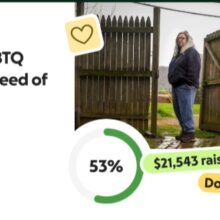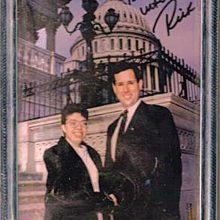Over 100,000 same sex couples in the US agree.
Starting in 2014, same sex couples were legally able to marry in Pennsylvania. Lots of people did.
Not everyone did.
When I share my story (domestic partnerships since 2006, married in 2021) – the first thing people say is “Why didn’t you get married right away?”
I don’t think people ask heterosexual people why they don’t marry as soon as possible. Yes, there are variants on this “Why haven’t you married yet?” “When are you two going to make it legal?” and other intrusive questions that are rude and occasionally offensive. But that’s not the same thing. It is challenging the social perception of marriage, not the legal credibility.
The response in my head is “None of your damn business” but privacy doesn’t win hearts and minds.
This reflects the vestiges of bias against same sex marriage and by default, the LGBTQ+ community. Marriage equality still comes with constraints and expectations that are different from opposite sex marriages.
The Trauma of Second-Class Citizenship
I suspect our reasons for not marrying right away are not that different from heterosexual couples, with one exception.
Imagine spending years, decades even, in a defensive crouch. It’s a reality most marginalized people experience. Every day in a society hostile to your existence, stories of hate crimes and indignation and bias, laws created to hold you down – it takes a toll, typically preparing your psyche to remain in the guarded stance for your own protection.
You build a life in that framework, a life filled with workarounds and a lot of legal actions to protect your family. It’s the defacto norm. It feels familiar, maybe not safe but the best you can do.
I have many stories of being taunted, mocked, and threatened.
I’ve been in human services since the mid-1990s and working since the mid-1980’s – the only place I ever worked where I did not witness or experience gay bashing (and sexual harassment) was my internship with Rick Santorum in his Congressional term. Obviously I share that to make a point about the prevalence of these experiences, the everyday grind of jokes, insults, slurs, stereotypes, and good intentions occupying time and energy that could be spent on productive things. I don’t think Rick Santorum’s harm to the LGBTQ+ community is up for debate. But what about the supervisors and board members and CEO’s of the nonprofits, typically men held in high regard? Their tolerance of these abuses, or participation in them, is reprehensible and should be exposed. But there’s been no Norma Rae moment because people are afraid of losing their job.
It takes a toll when you supervisors tell you to just turn the other cheek or use Christianity to rationalize bigoted behavior. Multiple supervisors in multiple jobs.
And that’s before I started this blog. The onslaught of vitriol, bias, and hatred are much higher because of the blog and social media, but it was there and a powerful force long before either existed. It shaped everything I did.
Pennsylvania Legislators Failed to Protect Us
Pennsylvania did not successfully pass a statewide LGBTQ law until 2024. That law banned conversion therapy for minors so its considered a negative law (prohibiting something) rather than a positive law (affirming or creating something.)
So in 2004 and 2009 and even 2013, there was little hope our elected officials could protect us. Even after 2014, it remains legal to discriminate against LGBTQ+ folx in 70% of Pennsylvania. Losing your job or housing is a good reason to take your time when considering marriage. Marriage licenses are public documents. You have to continue to take extra steps to protect your family. In most cases domestic partnerships are private personnel or human resources documents. Sometimes that’s the safer choice, the necessary compromise.
The City of Pittsburgh Domestic Partner Registry took the step of making the registry certificates public, but not the supporting documentation, suggesting more parity with marriage than a private employer might offer. Anyway …
Then, one day, the rules change. The restrictions are lifted.
I honestly think you expected every single same sex couple to get married right away – like hordes of people flooding a wedding dress bargain sale. And you look askance at those who waited, as if we did something wrong by being cautious.
There’s no such litmus test for heterosexual couples when they come of age to marry. It’s understood that there are different paths. A marriage is not more or less valid based on when people get married. We understand that about heterosexual couples – why is it that same sex couples are punished?
It wasn’t that simple for us. Assets had to be moved around, insurance plans changed, deeds and mortgages assessed, leases updated. And second parent adoptions were still necessary. Legal documents had to be changed which meant consulting experienced LGBTQ family law attornies who were also being consulted by everyone else. In some cases Functional Marital Equivalents (FME) had to be dissolved before marriage, in other cases that was automatic.
The longer you had been together, the more you had to consider. The world had changed, but it took a minute for the systems to catch up.

Other Changes
And there was the mental and emotional change. We had been second class for so long, it truly was hard to trust this change. While people were fighting court cases over wedding cakes, a lot of LGBTQ+ folx were coping with disproportionate degrees of poverty, racial injustice, and legal discrimination. Still. The trans community was still waiting for the “love means love” energy and resources to address their unique oppressions. That never happened.
Some disabled and senior couples still couldn’t marry without giving up life sustaining rights.
It wasn’t a simple thing to change your entire way of existence with all due haste regardless of what’s expected. We didn’t all aspire to mimic traditional cisgender heterosexual relationships. And we deserved time to figure out what same sex marriage would look like, how it would fit into our lives in a world that still disparaged us.
I suspect I was not alone in expecting backlash and potential erosion of the right to marry. Being prescient in this case was not a good thing.
Also factor in the expense of a wedding. At the time, I was repeatedly told we could just go to the magistrate and have a celebration later. Again, why do you expect us to have a different set of standards than opposite sex couples who might be engaged for years while saving for a wedding and/or honeymoon?
Then there are family issues. Not everyone is out to their family. This complicates the seating chart of a wedding reception and who gets invited to the magistrates office. Or how you deal with the family alcoholics (we had at least 3) who are sure to make a scene with the added layer of anti-LGBTQ bias in that mix? How do you start imagining these details that had seemed completely off the table just a year ago?
A pandemic wedding with three witnesses all wearing masks in our backyard eliminated all of the family drama. It was stark, stripped down, and barren much like the world around us. There’s only one thing I would change – I would have had the Mayor as the sole officiant because he has proven his commitment to the marriage ever since. Fidelity takes many forms.
In our case, we had perfectly valid reasons – a recent huge life change, health challenges, navigating the financial impact of disentangling and retooling our finances, family issues, as well as skepticism from years of oppression. Who are you or anyone else to require us to prove we complied with the marriage legitimacy guild?
None of that makes our decisions less valid. It simply makes them ours.
We are not alone.
According to research from Pew Charitable Trust, not everyone ran out to get married right away.
Consider this – while the number of same sex marriages has increased annually since 2014, the number of same sex couples cohabitating has also continued to rise.
Since 2015, the number of households headed by same-sex married couples in the United States has risen steadily from 425,357 to 774,553 in 2023, according to U.S. Census Bureau data.1The number of households headed by same-sex cohabiting couples has also risen over this period. It started at 433,539 in 2015 and increased to 536,894 by 2023.
Same-sex married couples represent a very small share of all married couples – just 1.3% in 2023. Same-sex cohabiting couples account for 5.6% of all cohabiting couples.
A 2022 research project by the National Institute of Health, found
Regardless of legal conditions, same-sex couples frequently face a social climate that resists acceptance of their relationships. As a result, some may avoid marriage because of potential hostility from family and employment discrimination associated with the requisite outing that accompanies marriage (Drabble et al. 2020; Ocobock 2013). Hence, who opts to couple and marry differs in important ways for same-sex and different-sex couples.
There are reasons that over a hundred thousand same sex couples opted to remain either cohabitating or in a FMU rather than marry. Anecdotally, I can confirm that most of our friends did not marry right away or at all. I wouldn’t dream of asking them why anymore than I would ask an opposite sex couple about their private lives. I will now because I’m researching this topic, but not so bluntly like I’m blaming them.
Specific to Pennsylvania, Gallup says 7.6% of U.S. adults identify as LGBTQ+, with data collected via phone survey in 2023. Census data from 2020 reports 40,290 same-sex households in Pennsylvania, with 54% of them married.
The census bureau estimated that 58.6% of same-sex couples living in Pennsylvania in 2017 were married. The 2020 U.S. census showed that there were 21,782 married same-sex couple households (9,837 male couples and 11,945 female couples) and 18,508 unmarried same-sex couple households in Pennsylvania.
In conclusion, while a lot of couples are marrying, a lot of us are not. A lot, a lot. So the myth of the “perfect relationship” in which a long-standing couple legally web in 2014 is not reflective of reality.
The Dissolution of Marriages, Functional Marital Equivalents, and Cohabitation
And as our marriage dissolves, new questions emerge. They would be slightly altered had we married in 2014, but not entirely.
The question is whether our 16 year domestic partnership created shared assets, financial commitments, obligations or would any functional marital equivalents.
If no, it strikes a blow against domestic partnerships – are they about families or just health insurance? If there’s no building of equity in those months and years, are they really a family building tool? The hoops we went through to get the domestic partnership suggest a real commitment is necessary, but the dissolution suggests it doesn’t matter. That’s a contradiction here in Pennsylvania.
In 2006, we filed an affidavit. In 2008, a domestic partner registry was created that was supposed to automatically include City employees (like my wife) but that did not happen. Then in 2013, the City contracted with a third party to audit all domestic partnerships – we were given five weeks notice to produce a huge array of documentation. We also discovered that the City had misplaced the physical file with the domestic partnership information. I honestly believe it was found in the basement when the incoming Mayor’s team pushed the matter.
Guess who called his team to ask them to find it? This girl.
It is also a contradiction in all fifty states albeit in a multitude of configurations. Civil unions, civil partnerships, domestic unions, common law marriages are just a few of the FME’s. Factor in people moving across state lines with no clear path to ‘transfer’ their relationship status and it is quite a mess.
I remember standing on a curb in Shadyside before the marriage equality celebration with some friends who were trying to figure out a path forward. One mom covered their kids on her insurance, but there was no option for a partner. The other mom spent a lot of money on insurance through her employer which would also not have covered a partner. The first mom’s employer told them to go to Maryland to get married and then get health insurance. Like they were buying a used car and just needed to get a title.
Th 2016 Neyman v. Buckley ruling by the Supreme Court of Pennsylvania grants family court judges the ability to dissolve a relationship such as a civil union from another state. But there’s little guidance on settlements or what constitutes assets from a partnership or union as opposed to a marriage.
The legislation establishing the City of Pittsburgh Domestic Partner Registry in 2008 says “this is not a marriage” but it also says that the County has a part to play in dissolution and suggests there can be such a thing as domestic partner property or assets. It doesn’t preclude it.
And what about FME’s that led to marriage? Then led to dissolution?
What about SCOTUS?
I think Project 2025 and all the conservative think tanks see the destruction of marriage equality as end game. Not just stopping new marriages, but dissolving existing marriages. It probably won’t be the Kim Davis case currently being presented because it seems pretty weak. But they’ll find one.
Consider abortion. Not content to simply dismantle Roe, they have come after states that still provide, permit, and/or fund abortion. Medicaid, bans for doctors, bans on traveling, and so forth. They are trying to crush every single aspect of reproductive health and they won’t stop until we unelect them.
That’s a literal blueprint to their plan with marriage equality which rested on the legal opinion of Roe.
I hope I’m wrong, but I’m not. I think we should all be taking every possible step to bolster LGBTQ rights on every front. When marriage equality first dissolves, people will need function marital equivalents to protect their families. When existing marriage are dissolved, it is going to be a legal nightmare for people like me who live in states with trigger laws.
Conclusions
If marriage equality is strong enough, it will prevail. But same sex marriage is not immune to racism, sexism, etc. Scratch that. Marriage equality cannot prevail in an authoritarian government unless the autocrat wants it to do so. Other more concrete constitutional rights such as birthright citizenship have been cast aside along with free speech, freedom of expression, freedom of the press, and due process in court proceedings.
We should prioritize the brutal assault on the trans community, the kidnapping of our neighbors, the fear and terror haunting the lives of many of our neighbors. But we must also remember that there are LGBTQ+ people in every oppressed group. Finding balance to protect the right and the life of a gay or queer person of color who is kidnapped by our government is incumbent upon us.
But we cannot be foolish enough to think they aren’t coming for us next. Stop the fascism now. But Project 2025 wants to nullify marriage equality. That’s very clear even if they don’t say it. They want to overturn the SCOTUS decision.
I believe that they won’t stop until they nullify existing marriages. Why would they stop? They haven’t stopped in any other policy roll-out.
It may not be the Kim Davis case. It may not be this year. But strengthening alternative ways to protect our families is important.
My experience suggests you damn well better get a lawyer if you are in a domestic partnership and create a cohabitation agreement. Obviously, I’m biased, but trusting anyone is foolish. Trusting the law as well. Trust yourself.
I don’t know how the legal situation will unfold in my case. I am quite terrified that the person I did trust the most in this world would cast me off without any resources simply because she can. I am not a rag doll. And I’m not a dependent whose care and feeding can be handed off to a friend, regardless of their resources. How is anyone okay with her choices? Why aren’t you saying something?
I do know that it would be lovely if people would stop implying that any same sex couple who did NOT marry in 2014 is somehow imperfect or flawed or even subhuman. These questions strip way the love and commitment, reducing them to a transactional exchange. There’s nothing wrong with a marriage based on economic decisions, but it is not the only factor.
What we should be asking is why so many same sex couples are not getting married? What do they know that we don’t?
Still with me? I am involved in two lawsuits around these issues with an adjacent third suit. Fixing all of these legal issues is not cheap or easy. In 2023, friends set up a crowdfund to help me with the daunting legal expenses and my living expenses. If you found this article interesting, helpful or useful, please consider donating.
It isn’t a tip or a cup of coffee. Those are nice ideals, but not my style. I need your help to pay these bills and not give up on what’s right by all same sex couples. And my other battle involves mental health rights and due process.
GoFundMe bit.ly/HelpLGBTQBlogger
CashApp $Pghlesbian
Zelle sitnscoop@gmail.com













